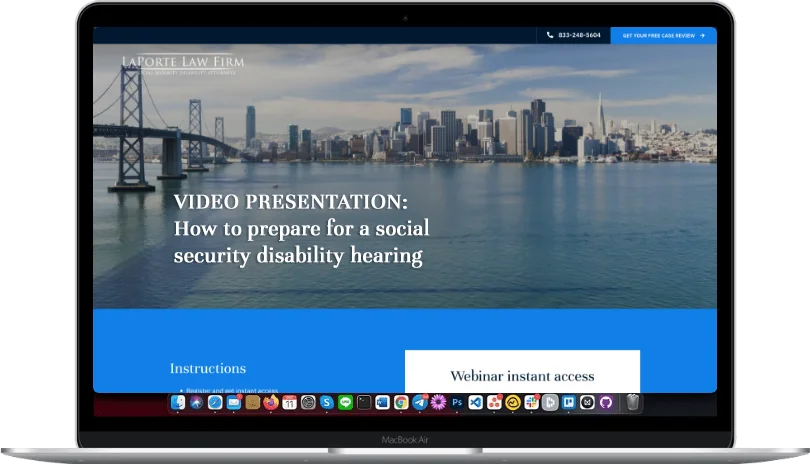
Social Security disability benefits provide crucial financial support to individuals who are unable to work due to a severe medical condition. As you manage your disability benefits, being informed about the types of income you need to report is key to avoiding potential pitfalls with receiving income while on Social Security disability. From wages to gifts and passive income streams, each type of income has specific reporting requirements that could impact your eligibility.
In this guide, we break down the essential information, ensuring that you remain compliant and safeguard your benefits. Let’s explore what type of income you need to report to the Social Security Administration (SSA).
Understanding Social Security Disability Programs
The SSA offers two different disability benefit programs: SSI and SSDI. While both programs provide support to people with disabilities, they have different nonmedical eligibility requirements and funding sources. It is important to understand the differences between the two programs because their income reporting requirements are different.
Overview of SSI (Supplemental Security Income)
SSI is a needs-based benefit, meaning eligibility is determined by financial need rather than work history. The program is designed to help individuals who have little or no income or assets and who need assistance meeting basic needs such as food, clothing, and shelter.
The SSA looks at all income when determining SSI eligibility, and there are strict income/asset limits for SSI beneficiaries. Some income may not count toward the SSI asset limit, but if your countable income is too high, you won’t qualify. Income includes:
- Wages
- Pensions
- Free food or shelter
- Social Security benefits, including Social Security retirement and disability benefits
To qualify, your countable resources (things you own) must be worth $2,000 or less for an individual, or $3,000 or less for a couple. This includes:
- Cash
- Bank accounts
- Property (other than your primary home)
- Stocks, bonds, etc.
Some resources, such as your home and one vehicle, usually do not count against the resource limit.
Overview of SSDI (Social Security Disability Insurance)
SSDI is an insurance program, not a needs-based program. It’s funded through Social Security payroll taxes (FICA) that workers and employers pay. To qualify, you must have worked long enough and recently enough, and paid enough taxes into the Social Security system to be “insured” for SSDI on your work record.
To qualify for SSDI, most people need 40 work credits, and 20 of those must have been earned in the last 10 years leading up to the onset of the disability. In 2025, you receive one credit for every $1,810 in wages or self-employment income, up to a maximum of four credits per year. However, younger workers may qualify with fewer credits, depending on their age.
SSDI benefits are calculated based on your average lifetime earnings before your disability began. The Social Security Administration uses a formula that considers your covered earnings (income you paid Social Security taxes on) over your working years to determine your primary insurance amount (PIA), or the base amount you’ll receive each month. Generally, the more you earn and the longer you work, the higher your monthly SSDI benefit.
Types of Income to Report
Because the nonmedical eligibility requirements are different for SSI and SSDI, the income reporting requirements are different. Before we explain the reporting requirements, it’s first important to understand the difference between earned income and unearned income.
Earned income
Earned income refers to money you receive from working, whether for an employer or for yourself. This includes wages from a job, self-employment income, freelance work, and earnings from side gigs such as driving for a rideshare service, delivering food, or doing contract work. Essentially, any income you actively work to earn is considered earned income.
Unearned income
Unearned income is money you receive without working for it actively. This includes income from sources such as pensions, unemployment benefits, investment returns (such as dividends or interest), and alimony. Unlike earned income, which comes from wages or self-employment, unearned income is not tied to your current work activity.
401(k) withdrawals
401(k) withdrawals are distributions you take from a retirement savings account where you contributed pre-tax earnings during your working years. When you begin withdrawing money from your 401(k), either due to retirement or another qualifying reason, those funds are considered unearned income because you’re not actively working to receive them, but drawing from savings you’ve previously accumulated.
Loans
A loan is money you borrow with the agreement to repay it later, usually with interest, and is considered unearned income because it’s not earned through work. Common types of loans include personal loans, student loans, auto loans, mortgages, and loans from friends or family.
Disability benefits
Other disability benefits include public short-term disability benefits and private disability benefits. For example, State Disability Insurance (SDI) benefits provided by the California Employment Development Department (EDD) offer temporary financial support for up to 12 months to people who can’t work due to a disability. Private disability benefits, such as short-term disability (STD) or long-term disability (LTD) insurance, are provided through private insurers or employer plans and can offer income replacement for longer periods. Because these benefits are not earned through current work, they count as unearned income.
Other income sources
Income can also include things such as gifts, settlements (such as from a lawsuit), insurance payouts, or gambling winnings. These sources are considered unearned income because they aren’t earned through work or by performing services.
Reporting Income as an SSDI Applicant or Recipient
Reporting income accurately is essential for SSDI applicants and recipients, as different types of income can affect eligibility and benefit amounts in different ways. Understanding how to report each type — such as wages, self-employment, or unearned income — can help you stay in compliance with Social Security rules and avoid disruptions to your benefits.
Unearned income
Unearned income does not affect eligibility for SSDI benefits. SSDI is based solely on your work history and disability status, not your financial need. There are no asset or income limits for SSDI, so money you receive from sources such as investments, gifts, or insurance payouts will not reduce your monthly benefit or affect your eligibility.
Unearned income does not need to be reported to the SSA. However, there are some limited exceptions.
Income from employers
Your current or prior employer may pay you money for sick pay, vacation pay, a termination agreement, or similar. This income may show up in any income reports that the SSA runs on your earnings record. When there is income reported on your earnings record, the SSA may inquire into the type of income you received. You should be ready to respond to any requests to explain that this income from your employer is not from work activity, but is instead unearned income.
Public disability benefits
Public disability benefits, such as state disability payments or workers’ compensation benefits, can affect your SSDI benefit amount. The SSA may reduce your SSDI benefits if your combined total of SSDI and public disability benefits exceeds 80% of your average current earnings before you became disabled. The purpose is to prevent people from receiving more income from disability benefits than they earned while working. If your total benefits are over that 80% threshold, the SSA will reduce your SSDI payment to keep the combined SSDI and SDI or workers’ comp amount within the limit.
Earned income and substantial gainful activity
When you apply for SSDI, your earned income does affect your eligibility because the SSA uses a standard called substantial gainful activity (SGA) to determine if you can work. SGA refers to the level of work activity and earnings that demonstrate you are engaged in meaningful employment. In 2025, if you earn more than $1,620 per month (or $2,700 if you are blind), it is generally considered SGA, and you may not qualify for SSDI benefits.
While you apply for benefits, all earned income should be reported to the SSA so they can determine whether you are performing SGA.
Earned income and the trial work period
Once you’re approved for SSDI benefits, you’re given a trial work period (TWP) that allows you to test your ability to work without losing your benefits right away. During the TWP, which lasts for nine months (not necessarily consecutive) within a 60-month period, you can earn more than the usual SGA amount while still receiving your full SSDI benefits. In 2025, a TWP is defined by working and earning more than $1,160 per month.
Once the TWP ends, the SSA reviews your earnings to see if you are working at or above SGA levels. If your monthly earnings exceed the SGA limit after the TWP, the SSA may determine that you are no longer disabled under their rules, and your SSDI benefits could be discontinued. This means you need to carefully monitor your work activity once the TWP is over to understand how it might affect your benefits.
If you receive Social Security disability benefits, you must report any money you earn from work. This helps the SSA decide whether you are in a trial work period or earning enough to be considered substantial work activity.
Reporting Income as an SSI Applicant or Recipient
If you’re receiving SSI, reporting income accurately is equally important. This is because SSI benefits are needs-based, and even small changes in your income, whether earned or unearned, can directly affect your monthly payment amount or eligibility.
Earned income
When you file a claim for SSI, it’s important to report any earned income you have to the SSA so that they can determine two key things:
- Whether you are engaging in substantial gainful activity: SGA is a measure of whether your work activity is significant enough to affect your eligibility for SSI benefits. If your earnings exceed a certain monthly amount, the SSA may decide that you are performing SGA-level employment, which could disqualify you from receiving SSI
- Whether you meet the strict asset and income limits: As mentioned, SSI is a needs-based program, so the SSA applies strict limits on your income and resources (assets). Reporting your earned income ensures that the SSA can accurately calculate your countable income and determine your benefit amount or eligibility.
Unearned income
Unearned income includes money you receive that is not from work, such as disability benefits, unemployment benefits, pensions, alimony, or interest. Reporting this income is important because the SSA uses it to determine your eligibility for SSI and to calculate the amount of your monthly benefit. Since SSI is a needs-based program, any unearned income you receive may reduce your benefits.
In-kind support and maintenance
In-kind support and maintenance (ISM) refers to food or shelter that you receive for free or at a reduced cost from someone else, such as family or friends. Instead of receiving money, you get something of value, such as a place to live, meals, or utilities paid for by someone else. ISM must be reported to the SSA.
When you receive ISM, the SSA may reduce your SSI benefits since you are getting help with your food or shelter costs. The reduction is calculated based on the value of the support you receive, which helps ensure that your total resources and support don’t exceed the program limits.
Timeliness of Reporting
If you are an SSI and SSDI beneficiary and are working and receiving earned income, you must promptly report all work activity and earnings to the SSA. For SSI recipients, you must report any earned and unearned income. This information must be reported no later than the 10th day of the month after the change in income.
Reporting Channels
By phone
You can report your income by calling the SSA:
- Phone number to report wages: 866-772-0953
- (Automated reporting line available 24/7)
- Phone number to report changes in income for SSI: 800-772-1213
- (Monday–Friday, 8:00 a.m. to 7:00 p.m.)
In person
You can visit your local Social Security office to report income. Find your nearest office at https://secure.ssa.gov/ICON/main.jsp. It’s best to call ahead to schedule an appointment or check the office’s walk-in policy. Bring your pay stubs or other income documentation.
By mail
You can also send your income reports to your local SSA office:
- Mail copies of your pay stubs and a cover letter with your:
- Full name
- Social Security number
- Contact information
- Explanation of what you are reporting
- Make sure to keep a copy of everything you send.
- Tip: Use certified mail or another tracking method to confirm delivery.
Online via your my Social Security Account
Income can be reported through mySSA, and you can save a trip to the SSA office.
- Go to: https://www.ssa.gov/myaccount.
- Create or log in to your account.
- Use the Report Wages feature to report your income each month.
If you have questions about your disability benefits or need help with an application or appeal, we’re here for you. LaPorte Law Firm proudly supports individuals and families throughout the Bay Area with compassionate, experienced legal guidance. Contact us today — we’re ready to listen and help.
FAQS
If you receive SSDI, you do not need to report 401(k) withdrawals or savings. This is because SSDI is based on your work history and earnings, not on your assets or unearned income, and 401(k) withdrawals are considered unearned income.
However, if you receive SSI, you must report your 401(k), savings, and any withdrawals. SSI is a needs-based program that considers both income and resources. Money withdrawn from a 401(k) is counted as income, and the value of the account may be counted as a resource.
The trial work period (TWP) is a work incentive program for people receiving SSDI that allows them to test their ability to work without immediately losing their benefits. During the TWP, you can work and earn any amount of income for up to nine months (not necessarily consecutive) within a 60-month (five-year) rolling period. As long as you report your work activity and continue to meet the medical requirements for disability, you will receive your full SSDI benefits regardless of how much you earn during those nine months. The TWP is available for SSDI recipients, not SSI recipients.
If you forget to report wages to the SSA, it can lead to serious consequences. The SSA may overpay your benefits, meaning you could receive more money than you’re eligible for. Once they discover the mistake, whether through a wage match with IRS records, employer reports, or a review, they will send you a notice of overpayment and require you to pay the money back, which can be a financial burden.
For SSI recipients, unreported wages can cause an immediate reduction in monthly payments or even make you ineligible, depending on your income. For SSDI recipients, if your earnings are over the substantial gainful activity (SGA) limit and not reported, your benefits may be stopped retroactively, and you could be asked to repay months or even years of benefits.
If you forget to report wages, it’s best to report them as soon as possible and keep records. You can also contact the SSA to explain the situation; sometimes, they offer repayment plans or may waive the overpayment if it wasn’t your fault and you can’t afford to repay.
















